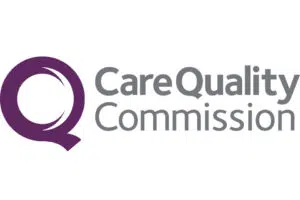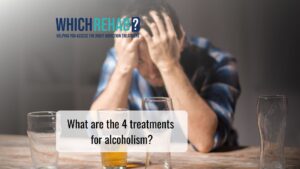Alcoholism is one of the most difficult addictions to kick. As such a big part of social life in the UK, not being able to participate can be very tough.
But, you can take strength in knowing that you’re not alone. At Which Rehab, we specialise in helping anyone struggling to find the most suitable alcohol rehab for your specific situation, budget and location.
Read on to find out everything you need to know about alcohol rehab and take those first brave steps to get on top of your addiction.
ARE YOU NEEDING ALCOHOL REHAB?
Our team of rehab and addiction specialists are on hand to talk to you day or night. Let us help you take back control.
Signs that you might have a problem with alcohol
Once you can see it is more than just having one too many drinks with family or friends and your drinking is starting to negatively affect your and your family’s lives then it is time to seek help. Denial is often a trait of those battling with alcohol addiction, however, there are a wide range of signs and symptoms that can indicate you or your loved one has an issue with alcohol.
Some common signs that you might have a problem with alcohol include:
1. Drinking in larger amounts or for longer periods than intended
One of the key signs of alcohol addiction is an inability to control your drinking habits. If you find yourself consistently drinking more than you originally planned or for longer periods than intended, it may be a sign that you have a problem.
2. Needing to drink to relax or feel normal
Using alcohol as a coping mechanism to deal with stress, anxiety, or other emotions can be a red flag for alcohol addiction. If you feel like you need to drink to relax, feel normal or ease mental health issues, it’s important to seek help.
3. Neglecting responsibilities:
Another sign of alcohol addiction is neglecting responsibilities such as work, school, or family obligations in favour of drinking. If alcohol use is interfering with your daily life and responsibilities, it may be time to seek help.
4. Withdrawal symptoms
If you experience withdrawal symptoms when you stop drinking, such as shaking, sweating, or nausea, it could be a sign of alcohol dependence. Seeking professional help is important in managing these symptoms safely.
5. Increased tolerance
Over time, your body may build up a tolerance to alcohol, leading you to need more and more to achieve the same effects. This can be a dangerous cycle that can lead to increased alcohol consumption and dependence.
Types of Rehab
Free vs Private Rehab Treatment
Finding the right rehab for you can be tricky. There are so many options out there and it is sometimes hard to know where to start.
One big question is whether to go private or free. Your financial situation and the severity of your alcohol addiction are key factors in the answer.
There are several charities available that you can reach out to for help, and you can also go through the NHS. The main drawback of these free options is they are severely underfunded. A lack of resources means they all take time. As alcoholism is a progressive addiction, time is something you might not have.
Your quickest and therefore safest route to recovery is through private treatment. After calling Which Rehab, you could be admitted in less than 24 hours and start your rehab journey under the care of professionals.
Inpatient Rehab Treatment
Inpatient alcohol rehabs have been proven to be one of the most effective forms of treatment when seeking help for alcohol addiction. This is because you benefit from 24/7 medical care at the treatment centre you’re been admitted to.
Inpatient alcohol rehab treatment is a structured program that provides intensive care and support for individuals struggling with alcohol addiction. This type of treatment involves staying in a residential facility for a designated period, typically ranging from 30 to 90 days and featuring constant care throughout.
One of the key benefits of inpatient alcohol rehab clinics is the round-the-clock supervision and medical support provided by trained professionals. This ensures that individuals receive the necessary care and support to safely detox from alcohol, manage withdrawal symptoms, and develop coping skills to maintain sobriety.
The treatment process involved with alcohol rehab centres typically includes a combination of behavioural therapy, group therapy, educational sessions, and holistic therapies such as yoga or art therapy. These programs are tailored to meet the unique needs of each individual and provide a supportive environment for healing and recovery.
By choosing to undergo inpatient treatment you are removing yourself from any triggers and external distractions that could cause you to relapse during your recovery process. You’ll receive a range of treatments tailored to the severity of your alcohol addiction and adapted to your personal needs.
Outpatient Alcohol Rehab Treatment
Outpatient alcohol rehab treatment is a popular option for individuals who are struggling with alcohol use disorder but want to maintain the responsibilities of everyday life, such as work or family commitments. This type of treatment allows individuals to attend therapy sessions and receive support while still living at home.
One of the main benefits of outpatient treatment programmes is that they offer flexibility in terms of scheduling. Patients can choose times that work best for them, allowing them to continue with their daily routines while receiving the necessary treatment for their dependence on alcohol. This can be especially beneficial for individuals who may not be able to take time off work or have other obligations that prevent them from attending inpatient treatment.
The outpatient approach to treatment typically involves individual and group therapy sessions, educational workshops, and support groups. Patients are also encouraged to participate in aftercare programs to help maintain their ongoing recovery.
However, outpatient treatment may not be suitable for individuals with severe alcohol addiction or those who require intensive medical supervision during detox. In these cases, inpatient treatment may be a more appropriate option.
BREAK FREE FROM ALCOHOL ADDICTION
It can feel hopeless falling into the pit of alcohol addiction. Don't struggle alone, help is at hand.
What Can I Expect During Alcohol Addiction Treatment?
Alcohol addiction treatment can vary depending on the individual’s needs and the specific program they are enrolled in. However, there are some common elements that you can expect to encounter during alcohol addiction treatment.
Alcohol Addiction Assessment
First and foremost, you can expect to undergo a thorough assessment and evaluation during the admissions process. This initial assessment will help the admissions team determine the extent of your alcohol intake, any co-occurring mental health conditions, and the best course of action.
Alcohol Detox
Following the assessment, it is common for individuals to enter into a medical detox. The detox process is a critical phase that helps individuals safely rid their bodies of alcohol and manage withdrawal symptoms. Withdrawal symptoms can range from mild to severe and may include nausea, alcohol cravings, anxiety, tremors, sweating, and even seizures in some cases. This is why it’s important to undergo detox under medical supervision to ensure your safety and comfort during this process.
Alcohol Rehab Treatment
During treatment, you will likely participate in individual therapy sessions with a licensed therapist to explore the underlying causes of your alcohol addiction and develop coping strategies to prevent relapse. Group therapy sessions may also be included to provide support and encouragement from others who are going through similar experiences. Some types of therapies on offer may include:
CBT
Cognitive behaviour therapy is a method to help patients change unhealthy behavioural thought patterns. It provides a solution-based foundation for patients seeking to change these deep-rooted patterns.
Intensive group addiction therapy
This approach allows people to share experiences with others who are dealing with similar issues of alcohol addiction.
12-step programme
Popularised by Alcoholics Anonymous, this a spiritual, abstinence-based rehab programme, that provides a set of guiding principles for the treatment of addiction to alcohol which focuses on your motivation to change your unhealthy thought patterns and addictive behaviours and reduce the risk of relapse.
Intensive individual addiction therapy
A space in which a counsellor can assist you to develop a deeper understanding of the issues that may have led to the development of an addiction disorder and devise a plan to help you rebuild a relationship with yourself.
Family and couple therapy
This treatment addresses the addiction as well as the relationships within the family to help you learn how to create goals and learn new behavioural techniques to develop the skills needed to make home life better.
Other alcohol addiction therapies
Education about alcohol addiction, its effects on the body and mind, and strategies for maintaining sobriety will also be an important component of your addiction treatment programme. This may include workshops, lectures, and educational materials to help you better understand the aspects of addiction and how to overcome it.
Throughout your alcohol rehabilitation, you will have access to a team of medical professionals, therapists, and other support staff who are dedicated to helping you achieve and maintain sobriety. They will work with you to create a personalised treatment plan that addresses your specific needs and goals.
Addiction Aftercare
After completing a formal alcohol rehab programme, many individuals continue their recovery journey through aftercare programs. These programs provide ongoing support and resources to help individuals maintain their sobriety and prevent relapse. This may include regular therapy sessions, support groups, sober living arrangements, and other resources to help you stay on track with your recovery.
Depending on the severity and duration of your alcohol addiction, you’ll be offered a variety of treatment options. Most alcohol rehabs specialise in delivering bespoke treatment programmes that address your medical, psychological, social, and holistic treatment needs.
Benefits of Alcohol Rehab
You’ve already taken the hard step in accepting you need help for alcohol addiction. The next step is to benefit from receiving treatment for your addiction at the best alcohol rehab for you.
Benefits of attending an alcohol rehab include:
- 24/7 nursing care around the clock during a medical alcohol detox
- A safe, recovery-focused environment and time in which to heal
- A bespoke alcohol recovery programme consisting of effective and evidence-based therapies and treatments
- You will be cared for by a team of qualified doctors, nurses, counsellors, psychotherapists and holistic therapists in addiction aftercare
Community Alcohol Rehab
If you are looking for a community-based alcohol rehab, we can help. We devise bespoke therapeutic alcohol recovery programmes that can be delivered in the community to tackle your alcohol problem and equip you with the needed tools to stay sober.
How Do I Find The Right Alcohol Rehab?
Please contact Which Rehab for a free-of-charge professional assessment of your alcohol rehab requirements. From there we can take care of everything for you, including the payments, admission and transportation; taking the stress out of your situation and ensuring that you access the best alcohol treatment for your individual needs through our extensive rehab directory.
We can also arrange urgent alcohol rehab, so please don’t delay accessing life-saving alcohol treatment and call us today.

Care Quality Commission - Alcohol rehabs you can trust
You can be sure that we’ll find the right rehab for your situation that follows all the best practices. Which Rehab only works with alcohol rehabs in London and across the UK which are registered with the Care Quality Commission (CQC). This body ensures that your alcohol addiction is treated with only the highest quality.
GET CONFIDENTIAL HELP NOW
Book your free confidential consultation call to discuss rehab options in Birmingham
FAQs
Recovery from alcohol addiction can be a difficult and challenging journey, but there are various paths that individuals can take to achieve sobriety. There are four main types of recovery that people may choose to follow when seeking treatment for alcohol addiction.
1. Abstinence-based recovery: This type of recovery focuses on complete abstinence from alcohol. Individuals in abstinence-based recovery programs commit to staying sober and avoiding any alcohol consumption. This approach may involve attending support groups like Alcoholics Anonymous, engaging in therapy, and developing coping mechanisms to prevent relapse.
2. Medication-assisted recovery: Some individuals may benefit from medications that can help reduce cravings for alcohol or alleviate withdrawal symptoms. These medications are often used in conjunction with therapy and other forms of support to help individuals maintain sobriety.
3. Harm -reduction recovery: Harm reduction focuses on helping individuals reduce the negative consequences of their alcohol use, even if they are not completely abstinent. This approach may involve setting limits on alcohol consumption, safer drinking strategies, and accessing resources to minimize harm.
4. Moderation management: Some individuals may choose to follow a moderation management approach, which involves setting limits on alcohol consumption and learning how to drink in a responsible and controlled manner. This approach may involve tracking alcohol intake, attending therapy sessions, and developing skills to manage triggers and cravings.
The right treatment plan for addiction will depend on the individual’s unique needs, goals, and preferences. It’s important to work with a qualified healthcare professional or addiction specialist to determine the best course of action for recovery.
When someone you care about has just completed a stay in alcohol rehab, it is important to approach the situation with sensitivity and support.
Saying things like, “I am so proud of you for completing rehab, it takes a lot of courage and strength to seek help and make positive changes in your life” will show you care and support your loved one.
There is no one-size-fits-all answer to what the best recovery method is for alcohol rehab, as each individual’s journey to sobriety is unique. However, there are several evidence-based approaches that have been shown to be effective in helping individuals recover from alcohol addiction. These include but are not limited to cognitive-behavioral therapy (CBT), Motivational Interviewing and Family Therapy.





